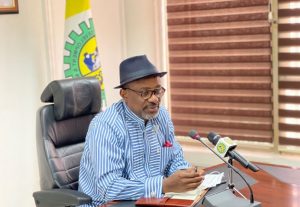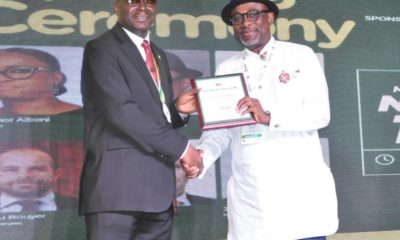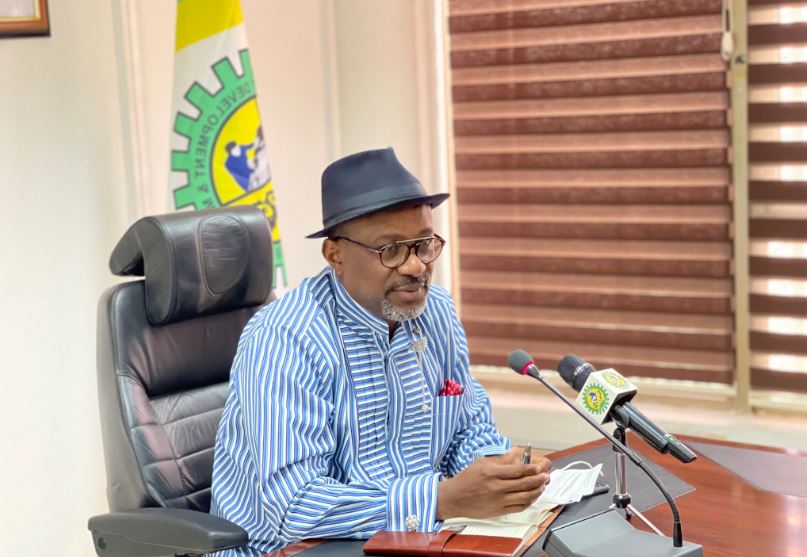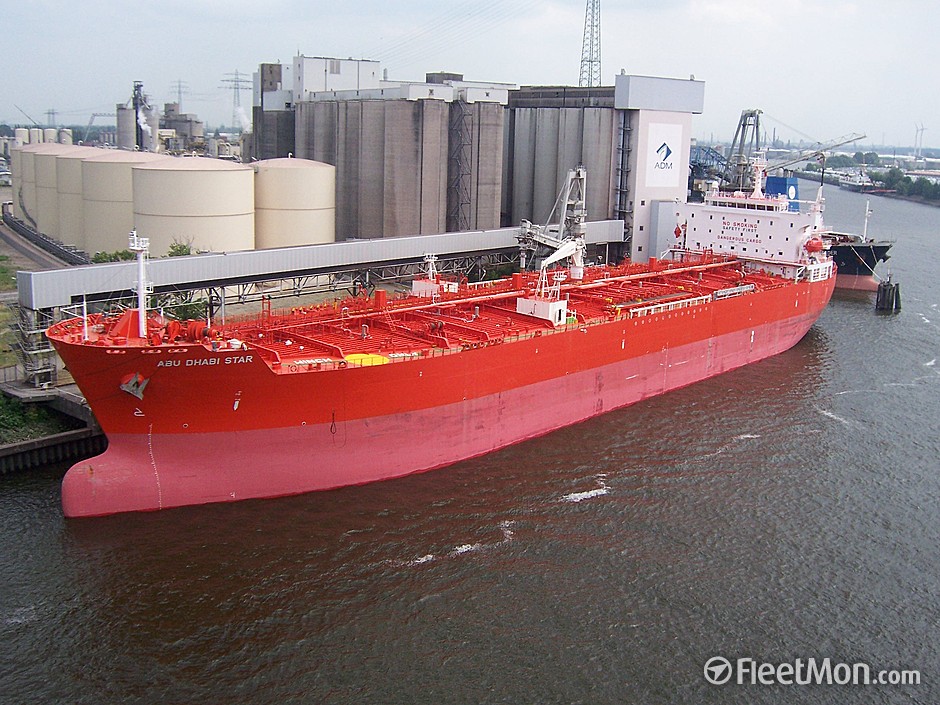Energy
NCDMB to Sanction Companies for Non-compliance with HCD Guidelines
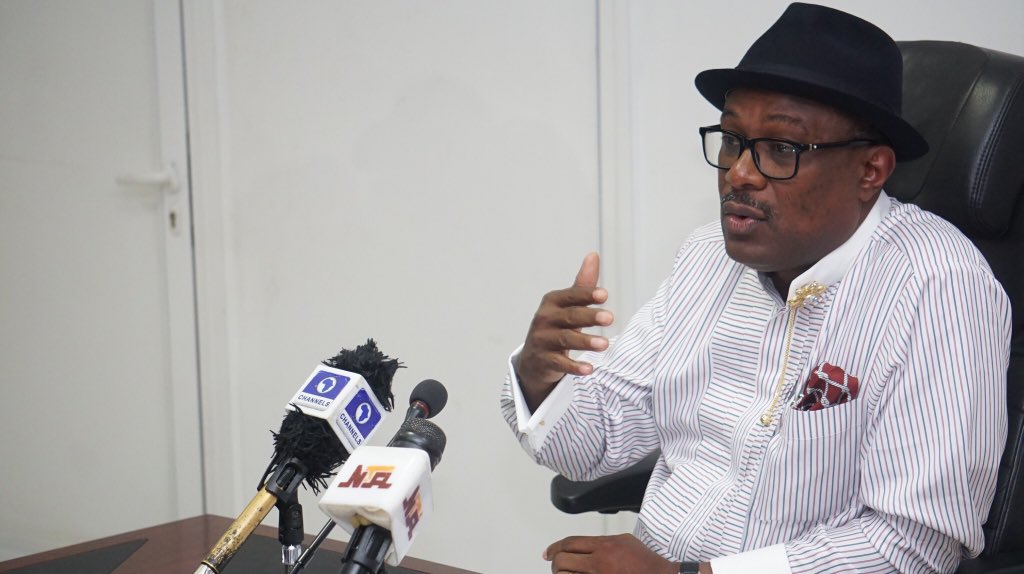
Modupe ASUDO
ABUJA-THE Nigerian Content Development and Monitoring Board says it will sanction companies that default or fail to comply with the Human Capacity Development provisions contained in the Nigerian Oil and Gas Industry Content Development Act.
The Executive Secretary, NCDMB, Engr. Simbi Wabote made this known on Tuesday while delivering a keynote address at the second edition of the Virtual Stakeholders workshop for Human Capacity Development in the Nigerian Oil and Gas Industry.
Speaking on the topic, Human Capacity Development: The Pillar for Nigeria’s industrialization, the NCDMB chieftain warned that the Board would enforce periodic forensic audit for HCD programmes and companies found violating the NOGICD Act 2010 and the Ministerial Regulations in executing cost intensive Capacity Development Initiatives as mandated by the Act would be sanctioned.
He said: “it has come to the attention of the Board that some operating companies and services companies are reluctant to implement the HCD programmes as directed by the Board. Most of the companies are testing the mettle of the Board and I want to use this opportunity to inform erring companies that the Board will meet appropriate sanctions to them as prescribed by the Act”.
He added that the Board is mandated to ensure that the industry derives maximum benefits from huge investments and also ensure beneficiaries of the HCD training programmes find gainful employment in the industry.
Stressing on the importance of human capacity development, Wabote said,”with the rapid advancement in technologies used in the oil and gas industry, our industry will continue to be manned by foreigners and expats, if we do not keep pace with the spate of technological development by developing the human capabilities required for the challenges of modern industrial technologies. It is with a view to developing the Nigerian workforce capable of leading and advancing technological developments in the oil and Gas industry and supporting the attainment of Nigerian local Content aspirations that the proponents of the NOGICD Act deemed it necessary to include clauses that mandate Employment and Training in the Act.”
Wabote commended the efforts of some operating companies and services companies that comply with the directives of the Board, noting that the future of the industry will be at risk without adequate investment in Human Capacity Development. He reiterated that Nigeria is leading Africa on Human Capacity Development in the oil and Gas industry.
“I can proudly say that we have the skilled workforce to lead and sustain the development of oil fields in Africa for the foreseeable future. All the major and serious oil and gas operating and service companies have Nigerians in very senior leadership positions and we are beginning to export our workforce across the world”, he added.
The Nigerian Content Boss further revealed that that the Board has trained over 13,000 workforce in different skill areas and over 5,000 are gainfully employed in the industry. He mentioned that various capacity development initiatives have been executed by the Board including upgrading and commissioned dilapidated facilities in vocational and tertiary institutions in Akwa Ibom, Bayelsa and Rivers States; trained the Science, Technology, Engineering and Mathematics (STEM) teachers in secondary schools and promoted Technical vocational Educational Systems (TVETS) policy across the country and equipping them with modern tools and machines and completed the ultra-modern vocational centre of excellence which was initiated by the Petroleum Technology Development Fund (PTDF) in Port Harcourt;
This year’s edition of the Human Capital Development (HCD) Workshop is aimed at Revamping Training and Development in the Oil and Gas industry in a post COVID-19 world while raising compliance with the new HCD Learning & Development Plan. It also seeks to improve “employability” of trainees as well as adopt technology to accelerate the quality and speed of training development.
Energy
Asharami Synergy Unveils Fuelling Solutions In Omagwa

In line with its commitment to driving access to quality petroleum products, Asharami Synergy Limited, a leading Sahara Group downstream company, has said the public can now access exceptional fuelling solutions at its newly commissioned retail station in Omagwa, Rivers State.
Situated strategically along the Airport Road in Omagwa, the station, which features a storage capacity of 45,000 litres each for Automotive Gas Oil (AGO, also known as diesel) and Premium Motor Spirit (PMS, also known as petrol) is equipped with two pumps and four discharge nozzles for PMS and AGO.
The facility also has ample space for sundry services in a bid to ensure consumers get more “miles and smiles” as well as the energy to “go further” with Asharami’s world-class products.
“The Asharami Omagwa Retail Station is fully operational, offering a range of premium products and services. It’s a one-stop shop that also gives our esteemed customers eat-in and take-out restaurant services, shopping, as well as the Asha lubricants and Asha Service experience which will ensure premium care for all classes of automobiles and engines,” said Oladimeji Williams, Head, Government Relations and Business Development at Asharami Synergy.
ALSO READ: NNPCL Launches Utapate Crude Oil Blend, Eyes Production Expansion In 2025
At the Commissioning, Willaims said the new station represents an important step in Asharami Synergy’s expansion plan aimed at reaching and serving more communities responsibly. “This station is strategically positioned close to the airport, serving as the gateway for powering socio-economic development in the community and those close to it, while enabling Asharami Synergy integrate all aspects of its downstream business towards ensuring efficiency and value for our customers,” he stated.
Williams commended the Federal Airport Authority of Nigeria (FAAN) and the Omagwa community leaders for their support and collaboration throughout the project’s duration, describing it as a “seamless and productive process that highlights Asharami’s corporate stewardship and social impact” in the community.
Similarly, Ifesinachi Ezike, Regional General Manager (South South), FAAN, emphasized the broader significance of the new station, stating, “This occasion marks a significant milestone not just for Asharami Synergy but for the airport and the entire community. It marks not just an opening of a new facility but the beginning of a renewed commitment to enhancing the travel experience of all our passengers and stakeholders”.
In a move that underscores its commitment to sustainability and community development, Asharami Synergy also commissioned a solar-powered borehole during the launch. The borehole is set to improve access to clean and reliable water for residents, marking a tangible contribution to the local community.
“At Sahara, we are always making a difference—not just through our business operations; we are unwavering in our commitment to driving sustainable development and building partnerships that enhance the well-being of our host communities,” Williams added.
Energy
Awards Galore For Shell, Staff At NAPE 2024 Conference

The Shell companies in Nigeria and staff won awards in recognition of their robust participation at the 42nd Annual International Conference and Exhibition of the National Association of Petroleum Explorationists (NAPE), held in Lagos.
At the closing dinner of the event, the Managing Director of Shell Nigeria Exploration and Production Company (SNEPCo), Ronald Adams pledged sustained efforts by the company to address “the Nigerian energy trilemma by powering progress towards energy security in a sustainable manner”.
On the awards, the Shell was declared Best Overall Exhibitor and Best Exhibiting Energy company (International) just as Geophysicist Somime Oguntola took home the Award of Excellence for Oral Paper (second place).
The icing on the cake was a Shell staff, Johnbosco Uche, being installed as the new President of the NAPE.
It was gathered that the Shell companies in Nigeria have supported NAPE since its founding in 1975, using the skills and expertise of the large pool of energy professionals in its employment to improve its activities especially educational and mentoring programmes.
In addition to being a major sponsor of the 2024 conference, Shell mounted a high-profile exhibition, featuring among other things, career counselling, engagements on Nigerian Content and Contractor development and panel sessions on Women in Industry and Sustainability Energy Challenge.
A highlight was the Shell medical stand which attended to more than more than 500 conference participants and members of the public over the four days of the annual event. The doctors and nurses offered a wide range of services including laboratory tests, deworming, medical consultation as well as ophthalmology checks and distribution of nearly 300 eyeglasses.
Adams referred to the operations of SNEPCo as an example of Shell’s contribution to energy security in Nigeria. “As a result of sustained production from Bonga, we have provided funds to finance development, created a new generation of Nigerian Deepwater professionals, empowered indigenous contractors and service providers, and implemented social investments that have touched lives in the six geo-political zones of the country,” he said.
Adams added, “SNEPCo and indeed Shell are in Nigeria for the long haul. Our commitment is reflected in both our current and growth plans, all of which are grounded in principles of safety, affordability, and competitive performance.”
Energy
Accugas Denies Culpability In Akwa Ibom’s Power Outage

Owing to the persistent power outage, which has crippled economic and social life in most parts of Akwa Ibom State and environs, Accugas Limited has washed its hands off the ugly situation.
This was contained in a statement under the signature of its Communications Manager, Okwudili Onyia, in which the company traced the anomaly to a “fault in the 132-KV Aba-Itu transmission line”.
To ameliorate the situation, the company maintained that “It is imperative that the restoration of the Aba-Itu line is completed as soon as possible.”
In addition, the company pledged thus, “Accugas will continue to partner with, and support, the government of Akwa Ibom State towards achieving the government’s agenda for economic development and prosperity of the state.”
ALSO READ: NNPC Ltd To Supply 100mmscf/d Gas To Dangote Refinery
The statement reads, “Accugas Limited, a subsidiary of Savannah Energy, wishes to strongly deny the misinformation concerning its alleged involvement in the current power outage in Akwa Ibom State.
“The power cut in Akwa Ibom State is entirely due to the reported fault in the 132-KV Aba-Itu transmission line, which, unfortunately, is preventing power being transmitted from the National Grid into the State. It is imperative that the restoration of the Aba-Itu line is completed as soon as possible.
“Ibom Power Company (“IPC”) is one of 23 thermal power generation companies which channel power to the National Grid, which in turn disseminates all accumulated power to each State of the Federation through the electricity distribution companies (“Discos”). Indeed, Accugas supplies gas to enable c. 20% of Nigeria’s thermal generation capacity and, as such, is a critical enabler of the Nigerian economy.
“Within Akwa Ibom State, Accugas has been the sole supplier of gas to IPC since 2014 and, together with other Savannah subsidiaries, has invested over US$1.5 billion in gas development within the state. Furthermore, Savannah has recently invested c. US$45 million in a gas compression project at Accugas’ Uquo central processing facility at Esit Eket. Accugas’ commitments also extend to several social investment projects in the state. All the foregoing investments and projects, including other imminent investments Accugas intends to make in the State, demonstrate the Company’s long-term commitment to Akwa Ibom State and Nigeria.
“Accugas will continue to partner with, and support, the government of Akwa Ibom State towards achieving the government’s agenda for economic development and prosperity of the state.”

